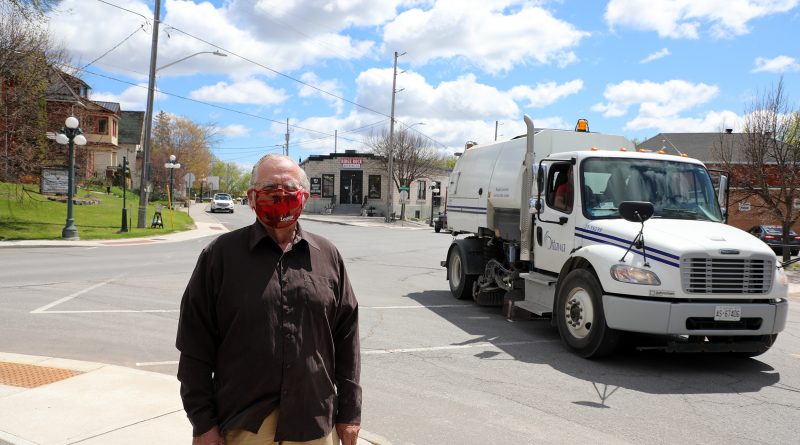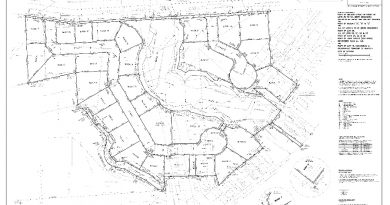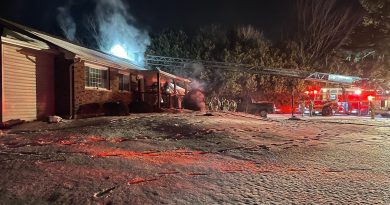Holmes hopes WC roads a focus of 2024 budget
WEST CARLETON – You don’t have to head too far off your property to see West Carleton roads are not in good shape, and Woodlawn’s Ken Holmes says if the City of Ottawa doesn’t start putting more money in to its infrastructure, they’re only going to get worse.
Holmes has long advocated for Ottawa’s rural roads regularly speaking to council and city staff about the need to invest more money in the integral rural infrastructure (you can see our coverage of his activism over the years here).
This year, a small Aug. 12 story in West Carleton Online about five local road projects wrapping up, triggered several community responses to West Carleton Online. Most underwhelmed by the amount of roadwork done in the community.
This triggered West Carleton Online to reach out to Holmes to get his well-researched take on one of West Carleton’s most popular water-cooler topics.
“I was ‘under-awed’ by the list of somewhat minor/trivial roadwork projects reported in Ward 5,” Holmes told West Carleton Online. “My focus continues to be the big picture approach to road maintenance, where we continue to fund to only about 50 per cent of what any public infrastructure expert will tell you is needed and, after almost 25 years of amalgamation, we still do not have an effective Infrastructure Management Plan.”
Holmes sat down with West Carleton Online last Friday (Aug. 25) at Alice’s Village Café in Carp to talk about the issue. Both he and West Carleton Online drove to the interview.
“If you want to see a vivid example of our mismanagement of roads, take a drive down Galetta Side Road and look at the road edges,” Holmes said. “The deterioration has accelerated this year to the extent that significant areas are unsafe for cars, cyclists and pedestrians. The root cause is a failure to maintain the gravel shoulder. That includes the need for the periodic addition of gravel and not just a futile attempt to scrape the diminishing remains of gravel, soil and weeds against the road edge. As a direct consequence, the lifespan of the limited repaving that we do is nowhere near the expected industry standard. So, not only are the roads in poor condition because we do not maintain them, there is a need for more maintenance money as the consequence of not practicing adequate preventive maintenance.”
Holmes, a retired Canadian Armed Forces member, regularly speaks to the city about this issue (and often about rural Internet service as well). He speaks at budget consultations, at Agriculture and Rural Affairs committee’s (ARAc) open mike sessions, one-on-one with city councillors when the opportunity arises, and he’s been doing it for years.
“There’s never meaningful public consultation,” he said. “But that’s not the problem. The fundamental problem is we’re not putting money in to the budget. We need about double.”
Holmes says infrastructure experts say budgets need about two per cent of the value of the infrastructure just for maintenance every year. The city’s road assets are at about $13 billion. Two per cent of that is roughly $260 million. Last year the City of Ottawa budgeted about $135 million – a roughly $2 million increase over the year before.
Last year was an election year, and a bump like that had not been seen in several years prior.
“It was good news, but nowhere near enough,” Holmes said. “Nothing is going to improve until we put money in to it. The reason people say the roads are in ‘bad condition and getting worse,’ is because the roads are in bad condition and getting worse. It’s no surprise, it’s inevitable.”
When Mayor Mark Sutcliffe was campaigning in the lead up to last year’s election, he promised he would increase roads spending by $100 million over four years. This year city council added $2 million in spending to the roads envelope in the 2023 budget.
Holmes said he had a brief chance to speak to the mayor last February. He says its challenging to assess the current council’s efforts because the problem has been going on for a quarter of a century.
“It’s hard to make an assessment because we don’t know the rules we’re playing under,” Holmes said. “Ottawa underfunds its annual road maintenance budget by $100 million less than experts recommend. Is it any surprise that 75 per cent of our roads do not make the ‘Good’ rating? Candidate Sutcliffe promised an additional $100 million over four years. Our roads need $100 million more work every year. We need to set a management guideline based on accurate figures. They haven’t been properly managed for 25 years.”
Holmes says the roads issue is not a secret to anyone.
“The conditions are so bad, event the mayors are admitting it,” he said. “This is not exclusive to roads. It’s too big an issue to get most individuals involved. The problem is so big, so prominent, so long-standing, you don’t need a resident to point it out.”
But not addressing it only makes the problem more expensive, as pointed out in Holmes’ Galetta Side Road example. The Ontario Heavy Construction Association says costs increase four times if road maintenance is not done in a “timely manner.”
“There’s not much more I can do as a private citizen then to go back to the city and tell them they are grossly underfunding on road infrastructure,” Holmes said.
And that’s exactly what Holmes will be doing, in part, on Sept. 7 when he attends the next ARAc open mic session where he will talk on rural transportation.
The City of Ottawa 2024 budget process officially begins on Tuesday, Sept. 5 when the city’s Finance and Corporate Services committee will be seeing the proposed budget directions at its regular committee meeting.












